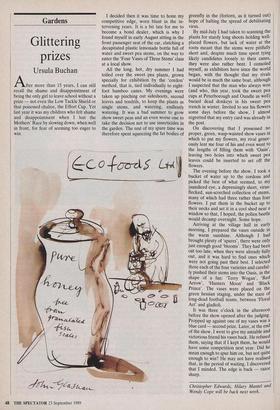Gardens
Glittering prizes
Ursula Buchan
After more than 15 years, I can still recall the shame and disappointment of being the only girl to leave school without a prize — not even the Low Tackle Shield or that poisoned chalice, the Effort Cup. Yet last year it was my children who felt shame and disappointment when I lost the Mothers' Race by slowing down, when well in front, for fear of seeming too eager to win. I decided then it was time to hone my competitive edge, worn blunt in the in- tervening years. It is a bit late for me to become a bond dealer, which is why I found myself in early August sitting in the front passenger seat of the car, clutching a decapitated plastic lemonade bottle full of water and sweet pea stems, on the way to enter the 'Four Vases of Three Stems' class at a local show.
All the long, hot, dry summer I had toiled over the sweet pea plants, grown specially for exhibition by the 'cordon' method, that is, tied individually to eight- foot bamboo canes. My evenings were taken up pinching out sideshoots, second leaves and tendrils, to keep the plants as single stems, and watering, endlessly watering. It was a bad summer to grow show sweet peas and an even worse one to take the decision not to use insecticides in the garden. The rest of my spare time was therefore spent squeezing the fat bodies of greenfly in the (forlorn, as it turned out) hope of halting the spread of debilitating virus.
By mid-July I had taken to scanning the plants for sturdy long shoots holding well- placed flowers, but lack of water at the roots meant that the stems were pitifully short and, despite much time spent tying likely candidates loosely to their canes, they were also rather bent. I consoled myself, as exhibitors have since the world began, with the thought that my rivals would be in much the same boat, although I suspected that the man who always won (and who, this year, took the sweet pea cups at Peterborough and Oundle as well) buried dead donkeys in his sweet pea trench in winter. Invited to see his flowers some days before the show, I almost regretted that my entry card was already in the post.
On discovering that I possessed no proper, green, wasp-waisted show vases in which to put my flowers, my rival gener- ously lent me four of his and even went to the lengths of filling them with 'Oasis', leaving two holes into which sweet pea leaves could be inserted to set off the flowers.
The evening before the show, I took a bucket of water up to the cordons and picked the best of what seemed, to my jaundiced eye, a depressingly short, vinis- flecked, sun-scorched collection of stems, many of which had three rather than four flowers. I put them in the bucket up to their necks and set it in a cool shed near a window so that, I hoped, the pollen beetle would decamp overnight. Some hope.
Arriving at the village hall in early morning, I prepared the vases outside in the warm sunshine. Although I had brought plenty of 'spares', there were only Just enough good 'blooms'. They had been cut too late, when they were already fully out, and it was hard to find ones which were not going past their best. I selected three each of the four varieties and careful- ly pushed their stems into the Oasis, in the shape of a fan: 'Terry Wogan', 'Red Arrow', 'Hunters Moon' and 'Black Prince'. The vases were placed on the green hessian staging, under the stare of long-dead football teams, between 'Floral Art' and gladioli.
It was three o'clock in the afternoon before the show opened after the judging. Propped up against one of my vases was a blue card — second prize. Later, at the end of the show, I went to give my amiable and victorious friend his vases back. He refused them, saying that if I kept them, he would have some competition next year. Did he mean enough to spur him on, but not quite enough to win? He may not have realised that, in the period of waiting, I discovered that I minded. The edge is back — razor sharp.


























































 Previous page
Previous page